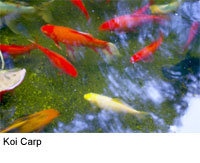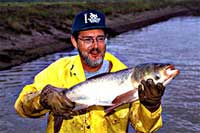|

 Game and eating fish: Carp are a popular angling and eating fish in many countries. While
tasty when grown in good water, carp can be riddled with small bones
in unpredictable locations. Most carp have a fishy taste and are
not considered to be good for eating in North America, although
they are popular in restaurants in Japan and Taiwan where the fish
are also considered to be signs of good fortune. Carp is a traditional
Christmas Eve dish in the Czech Republic, Germany and Poland. Game and eating fish: Carp are a popular angling and eating fish in many countries. While
tasty when grown in good water, carp can be riddled with small bones
in unpredictable locations. Most carp have a fishy taste and are
not considered to be good for eating in North America, although
they are popular in restaurants in Japan and Taiwan where the fish
are also considered to be signs of good fortune. Carp is a traditional
Christmas Eve dish in the Czech Republic, Germany and Poland.
 Celebrated in some places: Carp have food and angling value that is celebrated in some parts of the world. The carp has not yet gained gamefish status in the U.S. and are considered garbage among bass fisherman. In Europe on the other hand they are a trophy fish and lake owners are prepared to pay as much as £4,000 or $7,500 dollars for 40lb carp if fisherman fish for them on a catch and release basis. Celebrated in some places: Carp have food and angling value that is celebrated in some parts of the world. The carp has not yet gained gamefish status in the U.S. and are considered garbage among bass fisherman. In Europe on the other hand they are a trophy fish and lake owners are prepared to pay as much as £4,000 or $7,500 dollars for 40lb carp if fisherman fish for them on a catch and release basis.
Invasive species: Carp have attributes that allow them to be an invasive species
- a species than invades and dominates new ecosystems with serious
negative effects to the ecosystem and native fauna. The movement
and introduction of Carp for frivolous reasons such as fishing should
be not be tolerated.
Problems from Carp invaders: Reports of Carp muddying waters and destroying water weed through
their bottom-grubbing feeding habits are frequently reported after
their introduction, and are often accurate. Such raised turbidity
may have serious impacts on aquatic ecosystems and submergent macrophytes
("water weed"), and loss of submergent macrophytes may
also have serious effects on fish and invertebrate species reliant
on them for habitat.
Australian Carp Problems: In Australia, where the dominant Carp strain
was illegally introduced in the 1960s, there is overwhelming anecdotal
evidence and mounting scientific evidence that Carp do indeed raise
water turbidity, destroy a number of submergent macrophyte species,
and consequently seriously impact upon aquatic ecosystems and native
fish species dependent upon those submergent macrophytes. There
is also mounting suspicion that overwhelming numbers of Carp larvae
compete with native fish larvae for food.
All text is available under the terms
of the GNU Free Documentation License
|